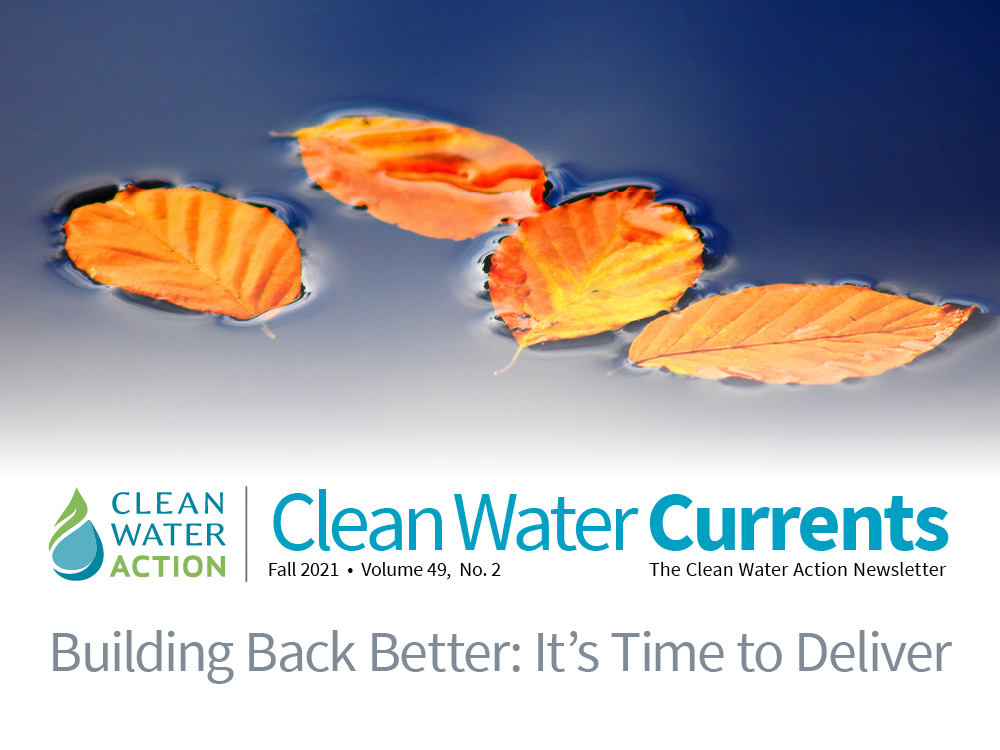In This Issue
- Time to deliver on Build Back Better
- Our Freedom to Vote
- Getting the lead out
- EPA must protect streams and wetlands
- EPA can protect our water from PFAS
- Shutdown the pipelines
- Wins for Clean Water across the nation
- Download the PDF of this newsletter
Building Back Better: It’s Time to Deliver
When voters elected Joe Biden and a Democratic controlled Congress in 2020 they chose a government that promised to invest in addressing our biggest challenges: the climate crisis, pandemic recovery, opportunities for families, health and child care economies, our physical infrastructure and more. The President’s Build Back Better Agenda set forth a bold vision for tackling these issues head on with the scale of investment that only the Federal government can make. Now it’s time for Congress and the President to deliver.
At time of publishing, Congress is debating the Build Back Better Act (BBBA), the primary legislative vehicle which can bring these investments to reality. By using the budget reconciliation process, Democrats can pass the BBBA with no Republican votes in the Senate — a necessary condition given the obstructionist tactics of the minority party. On October 28, President Biden released a framework that represents the final stage of crafting this package. Combined with the bipartisan infrastructure bill, which already passed the Senate, these two bills provide a once in a generation opportunity to invest in our future. Given the threats to our democracy being pushed by Republicans around the country, this is likely the last, best chance for the U.S. to do our part to avert the worst impacts of climate change.
We need a final package that invests in solving the climate crisis, protects our water and addresses environmental injustice. Here are a few Clean Water priorities we stand to gain if Congress does its job.
- An investment of $45 billion to replace all lead service lines in our water systems. The bipartisan bill includes $15 billion, and as we write, we welcome additional water investments that Congressional leaders and the White House have included in the BBBA framework.
- More than $550 million in climate investments, including clean energy electric vehicles, home electrification tax incentives and rebates. The framework extends, expands and creates new incentives for people and businesses to invest in a clean future.
- Ending fossil fuel subsidies. Taxpayers are on the hook for billions of dollars which go straight to padding the profits of oil and gas and coal companies — it’s time to end these polluting and unfair subsidies.
- These investments must benefit disadvantaged communities and people of color, who have for too long been harmed by a legacy of environmental racism and chronic disinvestment.
- While Clean Water Action doesn’t focus specifically on health or childcare issues, we recognize the importance of using this once-in-a generation opportunity to expand and strengthen the social safety net by guaranteeing paid family and medical leave, expanding Medicare, allowing Medicare to negotiate prescription drug prices, maintain the expanded child tax credits, fund preschool for three and four year olds, and more.
These investments for our water, climate, health, and future are on the line, which is why Clean Water and our allies are pushing hard for the Build Back Better Act and to make sure Congress delivers.
Protecting and Strengthening Our Democracy
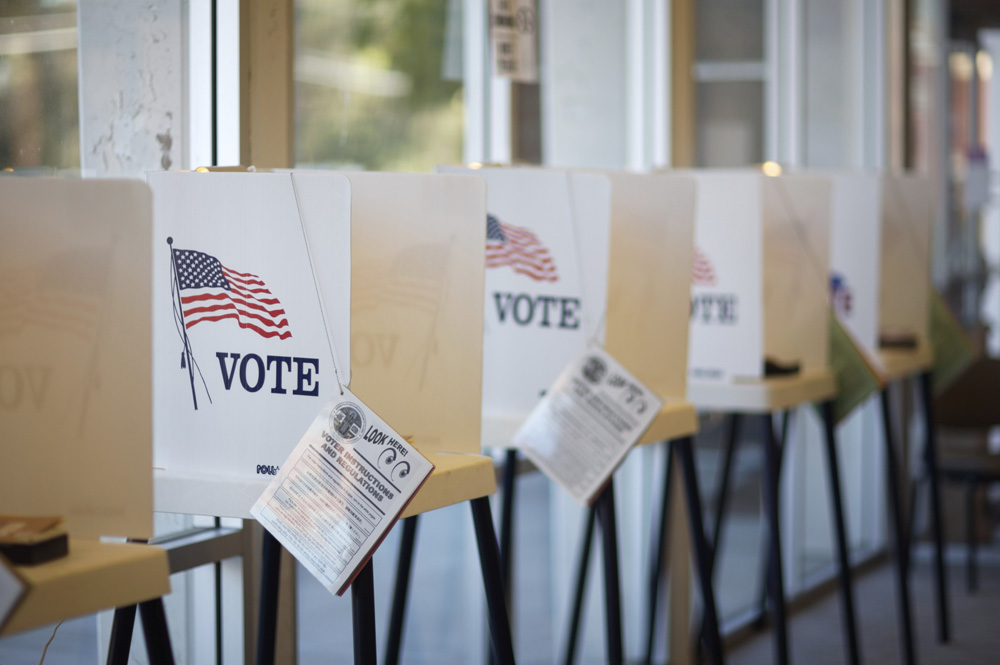
Since the 2020 election dozens of states across the country have introduced hundreds of bills to make voting more difficult, to give partisan state legislatures control of elections, and to make it easier to overturn the will of the people based on lies. States like Iowa, Georgia, and Texas have laws which will disproportionately impact voters and communities of color, low-income voters, seniors, and voters with disabilities. These laws are designed to do one thing: maintain the power of corporate special interests by undermining the power of the people and infringing on the freedom to vote. Our democracy is on the line.
The good news: People are fighting back. In the spring the House passed H.R. 1, the For the People Act to end partisan gerrymandering, expand access to the ballot, update ethics laws for elected and appointed officials, and reduce the power of corporate dark money on our elections. But Senate Republicans have repeatedly used the filibuster to block debate on the For the People Act. With these necessary reforms being held hostage by this arcane rule Clean Water Action and many other environmental groups, are calling on Senate Democrats to use their majority to reform the filibuster in order to protect and strengthen our democracy.
Now, a group of Senators including Joe Manchin and Amy Klobuchar drafted a new, better bill. The Freedom to Vote Act, which will:
- Expand and protect voting rights and access to the ballot.
- Ensure that voters choose their leaders, not the other way around by ending partisan gerrymandering.
- Reduce the impact of dark money on our elections.
- Make Election Day a National holiday.
- Restore voting rights to formerly incarcerated people who have served their sentences
- Protect elections officials from partisan influence.
- Make it harder for states to undermine access to the ballot.
Just before this newsletter went to press, Senate Republicans filibustered the “Motion to Proceed” on the Freedom to Vote Act, stopping debate on this bill for now.
A companion bill, the John Lewis Voting Rights Advancement Act, would restore the Voting Rights Act by reinstating the concept of “preclearance”, where states with a history of suppressing the votes of low income communities and communities of color through laws that reduce access to the ballot. This would require states who meet certain criteria to submit any new voting laws to the US Department of Justice for review to ensure these laws don’t make it harder to vote.
Clean Water Action has made it a priority to pass the Freedom to Vote Act and the John Lewis Voting Rights Advancement Act because a healthy democracy is essential to a healthy environment. Protecting and strengthening our democracy will give us a fighting chance to protect our water, take bold action to address the climate crisis, and safeguard our communities. The influence of corporate special interests has slowed or even reversed progress cleaning up toxic chemicals, safeguarding drinking water sources, and holding polluters accountable.
You can take action to protect our democracy here.
EPA Must Do More to Protect Our Water from PFAS
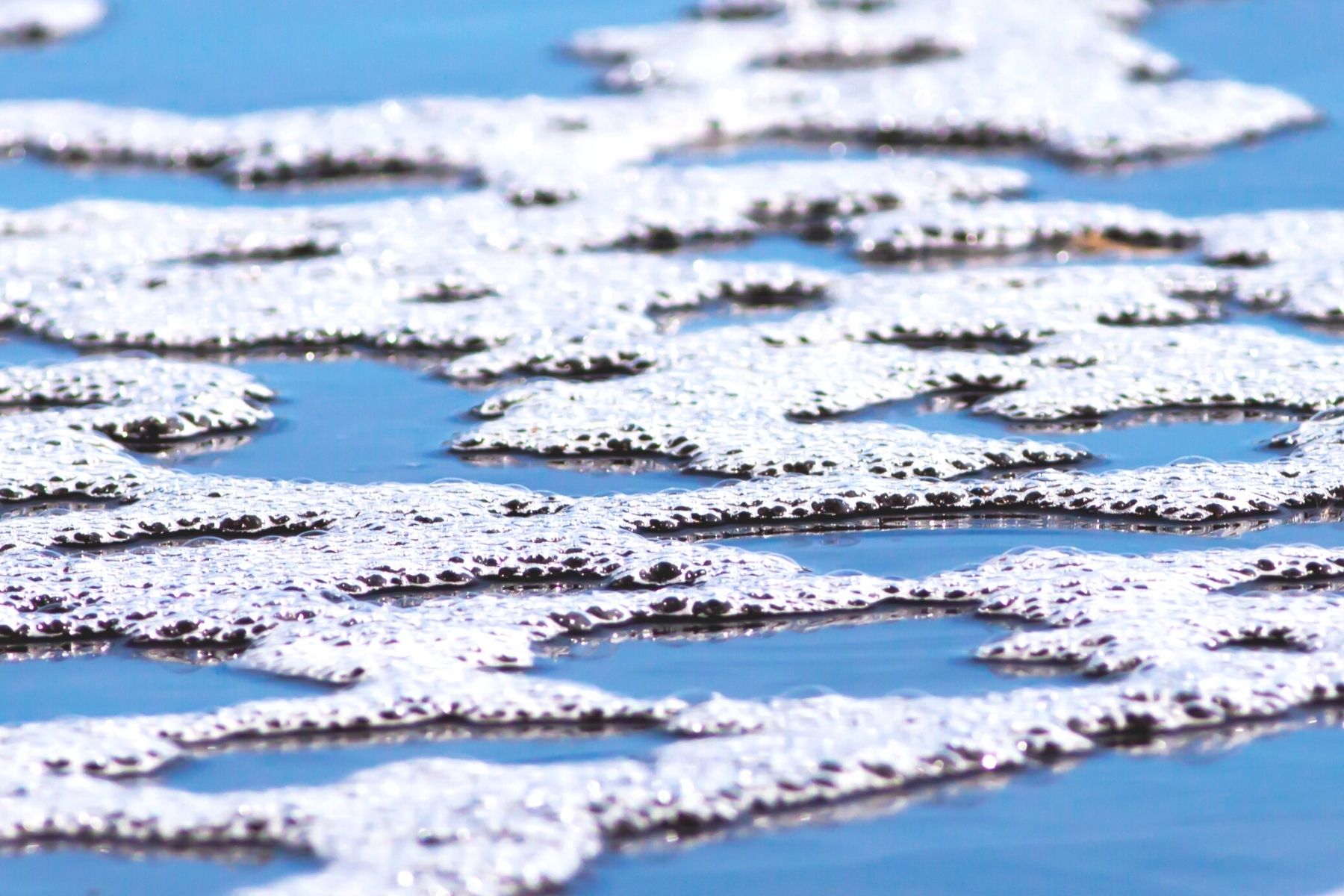
In September the Environmental Protection Agency (EPA) released its latest plan for regulating wastewater pollution. As part of this plan EPA announced it will be drafting new rulemakings for facilities that manufacture or formulate PFAS, for chrome-plating facilities that use PFAS, and for meat and poultry processing plants, which discharge high levels of phosphorus and nitrogen.
These are all encouraging developments and Clean Water Action supports EPA’s decision to craft these new regulations, but we are concerned the agency is not moving quickly enough to address all industrial dischargers of PFAS. These toxic “forever chemicals” are used in a staggering number of consumer products ranging from clothing to food packaging to paint, and we think EPA should expand the number of industries that have to control their PFAS discharges.
At a minimum, EPA should expand its current PFAS regulatory plan to include textile mills, paper manufacturers, electroplating facilities, landfills, leather tanneries, paint formulators, plastics molders, petroleum refineries, and metal finishers other than chrome platers. These types of facilities are all known or suspected of discharging PFAS into water bodies. There is legislation in Congress, the Clean Water Standards for PFAS Act, which would require EPA to revise regulatory standards (known as Effluent Limitations Guidelines and Standards, or ELGs) for nine different industrial sectors. The House has already passed this legislation, and the Senate should do the same.
EPA should also streamline its process for revising ELGs to include multiple industrial categories that discharge PFAS, instead of revising one industrial category at a time. ELGs are technology-driven standards, meaning that industries are required to use the best available technology (BAT) or treatment methods to eliminate or reduce pollutants of concern. As EPA works to identify BAT for facilities that manufacture or formulate PFAS and for chrome-plating facilities that use PFAS, it should also consider whether or not those same treatment technologies are appropriate for other facilities that discharge PFAS.
Ultimately it’s a state or water permit writing authority that implements ELGs in water pollution permits. In addition to revising ELGs, EPA should issue guidance reminding states of existing Clean Water Act tools they can use to address PFAS discharges. Some states like North Carolina and West Virginia already use these tools to prohibit or limit discharges of PFAS in water pollution permits, and many other states like Colorado and New Jersey are requiring monitoring of PFAS in permits. It will likely take several years before EPA finalizes new standards to control PFAS in wastewater discharges, and states should not wait to protect their communities from these toxic chemicals.
Lead and Our Drinking Water
As this newsletter went to press, success in winning significant federal investment in getting lead out of drinking water appears to be right around the corner. Clean Water Action has worked for several years to make the case for this funding. Where the lead service lines that bring water from the large main in the street to the home or building are present, they are the largest source of lead in drinking water. Through the organization’s work with the Lead Service Line Replacement Collaborative, Clean Water has partnered with diverse organizations to help water systems and communities replace these pipes.
Getting this job done nationwide is critical to reducing lead in drinking water, and the arguments for federal investment are strong. The funding advocates hope the U.S. Congress is likely to include in infrastructure bills that can help replace lead pipes more quickly and more equitably. Clean Water Action will keep pushing for the most robust investment possible in this extremely popular infrastructure issue.
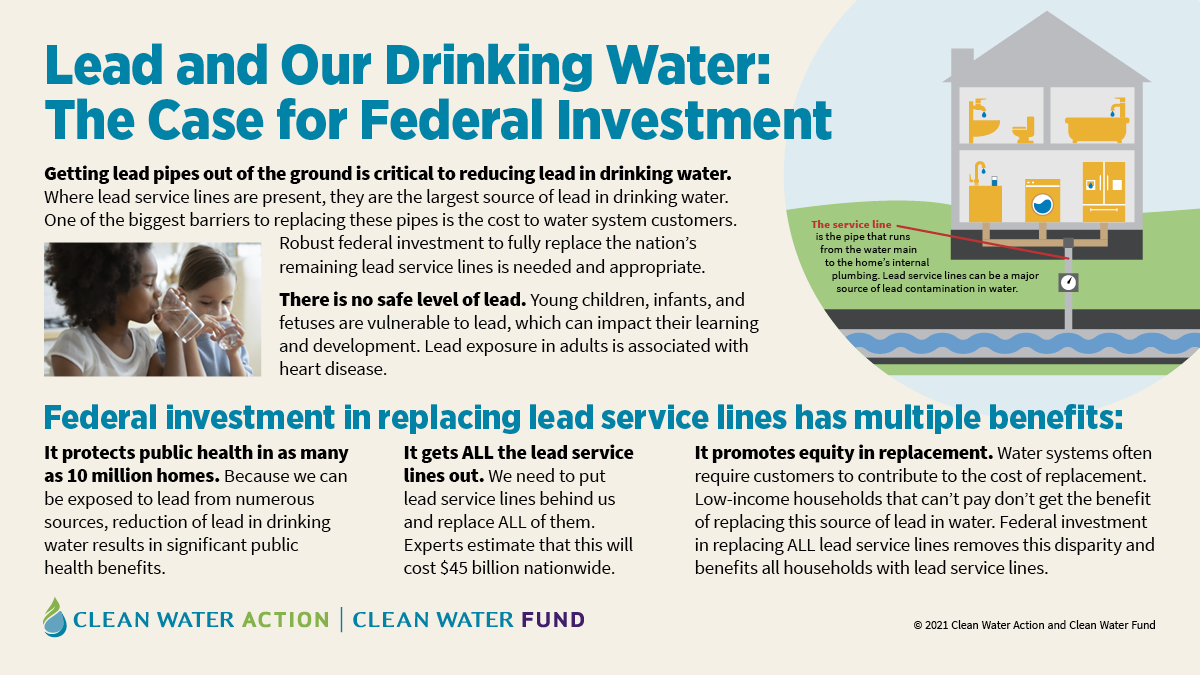
Administration Should Move Quickly to Protect Water
Clean Water Action and allies continue to push the Biden administration to quickly restore vital protections to all of the nation’s streams and wetlands. Since the Trump-era Dirty Water Rule took effect in June 2020, thousands of small streams and wetlands across the country have been denied protections from pollution or destruction. Though the Administration has vowed to fix the problems created by the Dirty Water Rule, it has yet to announce a clear timeframe for doing so.
Following a pair of late summer court decisions that threw out the Dirty Water Rule — the first brought by several Tribal nations in Arizona and the second by the Navajo Nation in New Mexico — the U.S. Environmental Protection Agency (EPA) and the Army Corps of Engineers (the Corps) announced they will no longer follow the 2020 rule. The courts concluded that the rule was scientifically and legally flawed and had the potential to cause serious harm to our water.
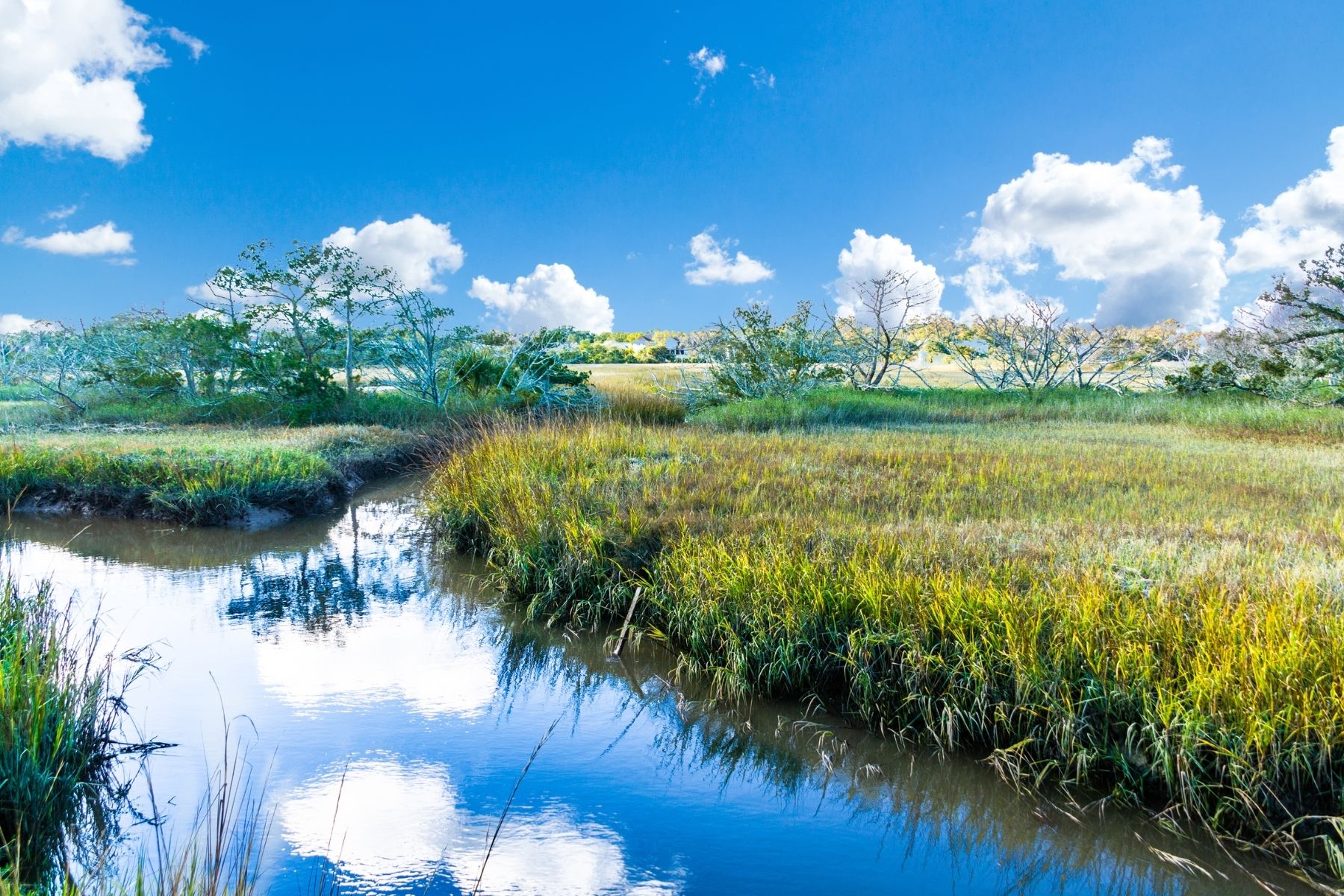
While this is positive news, EPA and the Corps have yet to propose a rule to replace the illegal Dirty Water Rule. This means we are stuck with 1980’s era clean water protections that are outdated and woefully inadequate. In order to fulfill the promise of the Clean Water Act, the agencies must develop and finalize a replacement rule that is grounded in science.
Science tells us that all streams and wetlands, regardless of size, are critically important to the health of rivers, lakes, and other water bodies. Headwater and seasonally flowing streams, along with ephemeral streams (streams that flow only after rain or snow) feed the drinking water sources for millions of people living in the U.S. If we allow industries to dump toxic chemicals into these small streams, it could increase the drinking water treatment costs for communities living downstream.
Wetlands are important to preserve because they absorb floodwaters, protecting communities from destruction and property loss. Wetlands are also the kidneys in a watershed, filtering out pollutants like nitrogen and phosphorus that can contribute to toxic algal outbreaks in lakes, bays, and other water bodies. If developers are allowed to destroy wetlands, downstream communities will be put at increased risk of flooding. In the era of climate change and extreme weather events, these are invaluable ecosystems.
Clean Water Action is committed to advocating for a strong rule that will ensure equal protections for all of our water. We know this work won’t be easy — polluting industries are already lining up to oppose the agencies’ efforts to strengthen clean water protections. Over the next many months you will be hearing from us when there are opportunities to take action to help fix the Clean Water Act. We hope you will continue to join us in fighting for this precious resource that none of us can live without.
Shut Down the Enbridge Pipelines
Wherever they occur, oil spills are catastrophic. What doesn’t get as much attention are inland oil spills, despite some very big spills in the United States in recent history.
The second largest spill was in Michigan 11 years ago. Nearly 1 million gallons of crude tar sands oil spilled into the Kalamazoo River. The 30 mile long spill was contained before it reached Lake Michigan, 80 miles away.
The largest inland oil spill occurred in Minnesota 30 years ago. 1.7 million gallons of crude oil spilled into a wetland and travelled through a storm drain onto the frozen Prairie River. The cold temperatures stopped the oil from reaching the Mississippi River just 2 miles away.
Both spills occurred on pipelines now owned by Enbridge.
We’re fighting to protect clean water and to protect our planet no matter how long it takes.
In Michigan, Enbridge has continued operating Line 5 since May, defying the shut down date authorized by state law. Clean Water Action is calling on President Biden to stand with Governor Whitmer in rejecting both Enbridge’s delay tactics and the Canadian government’s attempts to keep the 69-year-old Line 5 pumping oil indefinitely through the heart of the Great Lakes. With the Oil and Water Don’t Mix Coalition, we delivered more than 30,000 petition signatures to the president and are continuing to mobilize support across the country and across the Great Lakes.
In Minnesota, the Line 3 pipeline construction has been completed — and Enbridge has already caused extensive damage to water before the first drop of oil flowed. Construction of the pipeline punctured an aquifer in January, although the problem only came to light in September when the Minnesota Department of Natural Resources ordered Enbridge to pay a $3.3 million fine and fix the damage within 30 days (a deadline that has come and gone). So far at least 24 million gallons of water have been drained, threatening critical and protected wetlands. President Biden and the Army Corps of Engineers have the ability and authority to conduct a federal Environmental Impact Statement and thoroughly examine the environmental and social impacts of Line 3, and the presidential permit required for oil to flow through the pipeline can be revoked.
It’s important that we remind the Biden Administration that allowing Line 5 to remain open and Line 3 to begin and continue operation hinders our abilities to fight climate change, protect clean water, and achieve environmental justice — all commitments he and his administration have made. Michigan and Minnesota have already experienced the damage that Enbridge pipelines can do — and we know our future is fresh water, not fossil fuels. Keep up the pressure — send a message now here.
Wins for Clean Water Across the Country
With your support, Clean Water Action is making a big impact for our water, health and communities across the country! Check out this roundup of the latest and greatest accomplishments. To support our programs, make a special contribution here. By speaking out together, our voices are heard!
California
Clean Water Action celebrated a big win for our water, environment and health when Governor Gavin Newsom signed AB1200 into law, which bans toxic PFAS in food packaging and requires cookware companies to give us our right to know if harmful chemicals are in cookware. Clean Water Action co-sponsored this bill alongside Breast Cancer Prevention Partners, NRDC, Environmental Working Group, and Clean Water Action.
Connecticut
Connecticut is now a national leader in taking action to restrict major sources of toxic PFAS chemicals from further harming public health and our environment. Connecticut Governor Lamont signed a law banning PFAS in food packaging and firefighting foam, while requiring the state to implement a take-back program and shift to a safe, fluorine-free foam. Clean Water Action led this initiative along with a coalition of diverse allies. Clean Water Action members played a critical role in getting this important bill over the finish line.
Maryland
Maryland’s legislative session resulted in the passage of several important bills promoting our priority campaigns including zero waste, better septic regulations and forest protections. HB264/SB483 will reduce the amount of organic waste heading to landfills and incinerators and SB304 clarifies that burning trash is NOT recycling. HB407/SB22 will make sure property transfer inspectors (the people who tell homeowners and homebuyers whether or not their septic system works) have a professional licensing system like comparable industries in Maryland and HB878/SB701 will allow counties to bond Bay Restoration Funds for septic repairs, giving counties more flexibility and residents more tools to fund septic repairs. Clean Water Action also helped stop two bills that would have harmed forest protections.
Massachusetts
Helped ensure passage of the Children and Firefighters Protection Act to protect children, families and firefighters from toxic flame retardant chemicals. This victory would not have been possible without the support of Representative Marjorie Decker, Senator Cindy Creem, Senator Bob DeLeo, Senate President Karen E. Spilka, the Professional Fire Fighters of Massachusetts (PFFM), all of our partners in the The Alliance for a Healthy Tomorrow, and every Clean Water Action member who took action over the past 8 years.
Michigan
After a long fought battle, the aging Line 5 pipeline running through the Straits of Mackinac will be permanently shut down (pending the results of an Enbridge lawsuit). For 67 years, this pipeline has risked Michigan’s most precious natural resources and has spilled a cumulative total of over 1 million gallons of oil. With the Governors’ action in November 2020, this dangerous pipeline will no longer threaten our Great Lakes, the drinking water source of millions of Americans. This victory would not have been possible without the leadership of Governor Gretchen Whitmer and every Michigander who took action to help protect the state’s water resources.
Minnesota
Minnesota recently celebrated a few clean water and public health victories including a ban on PFAS in food packaging starting in 2024! The legislature also acted to protect more Minnesota children from lead by lowering the blood lead level required for action to be taken and by expanding where lead assessments can be completed when a child tests positive for lead exposure. The measure also increases the ages eligible for testing and protective measures to 18 to ensure that all of Minnesota’s children have a chance to benefit from support services if they are exposed to lead.
Clean Water also stopped harmful provisions from entering the final state budget agreement as well: 1) A proposal that would have overturned Minnesota’s nuclear moratorium. 2) A proposal that would have allowed for the incineration of plastics to be considered recycling in Minnesota (known by the brazenly misleading term “advance recycling”). Clean Water Action thanks state legislative champions, as well as every single member who made a call, sent an email, took action and encouraged others to do the same, and supported with a donation. Clean Water members truly made the difference.
New Jersey
Clean Water Action celebrated a watershed victory when PennEast canceled its 116-mile project that would have harmed precious resources and waterways from Northeast Pennsylvania to Mercer County in NJ! Stopping this dangerous and unnecessary pipeline would not have been possible without the tireless efforts of the members and organizers of Clean Water Action and its partners, local activists, and champion elected officials.
Clean Water’s New Jersey team also helped to permanently ban hydraulic fracturing aka fracking throughout the Delaware River Watershed region in NJ, NY, DE and PE, protecting the drinking water supplies for millions. This victory would not have been possible without the support of NJ Governor Murphy, Clean Water Action members, canvassers, and volunteered, and coalition partners and allies Delaware Riverkeeper, Sierra Club, Environment America, Catskill Mountainkeeper, Food & Water Watch, NRDC, League of Women Voters and so many more who fought for over a decade.
Clean Water also played a huge role in passage of the strongest Environmental Justice law in the nation to protect vulnerable communities from the cumulative impacts of pollution, as well as the strongest law to ban single-use carryout bags and polystyrene foam food service products in stores and food service businesses.
Texas
After many years of effort by Clean Water Action and our allies, the Austin City Council gave final approval to requirements that major new developments install dual plumbing so they can capture and use onsite recycled city water as well as rainwater, AC condensate, and treated grey water and back water for toilet flushing, irrigation and more. This will help build resilience to climate change, extend water supplies and keep water bills in check.
